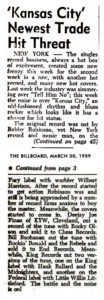Written and first recorded by Russ Ballard (1976).
Also recorded by Nona Hendryx (1977).
Hit version by Santana (US #17/#2 Rock/SA #12 1981).
From the wiki: “Russ Ballard came to prominence as the lead singer and guitarist for the band Argent (‘Hold Your Head Up’ 1972), but became better known by the late 1970s as a songwriter and producer. His compositions for other artists during the 1970s and 1980s included ‘Liar’ (Three Dog Night, 1971), ‘Since You Been Gone’ (Head East, 1978; Rainbow, 1979), ‘New York Groove’ (Ace Frehley, 1978), ‘You Can Do Magic’ (America, 1982), ‘God Gave Rock and Roll to You’ (Kiss, 1992), and ‘Winning’, a 1981 hit for Santana that Ballard first recorded in 1976 for his album Winning.
“Prior to Santana’s cover, former LaBelle singer, Nona Hendryx, covered ‘Winning’ in 1977 for her solo debut album.
“Santana promotional single, for the album Zebop!, peaked at #17 in 1981 on the Hot 100 but reached #2 on the Mainstream Rock Charts. Santana’s arrangement also reached #12 in South Africa.”


